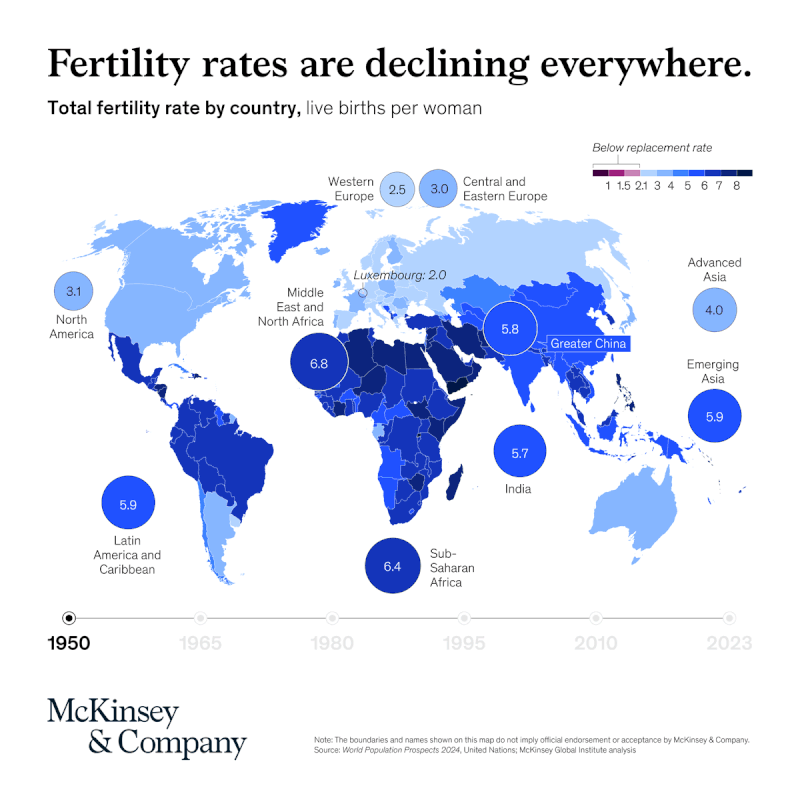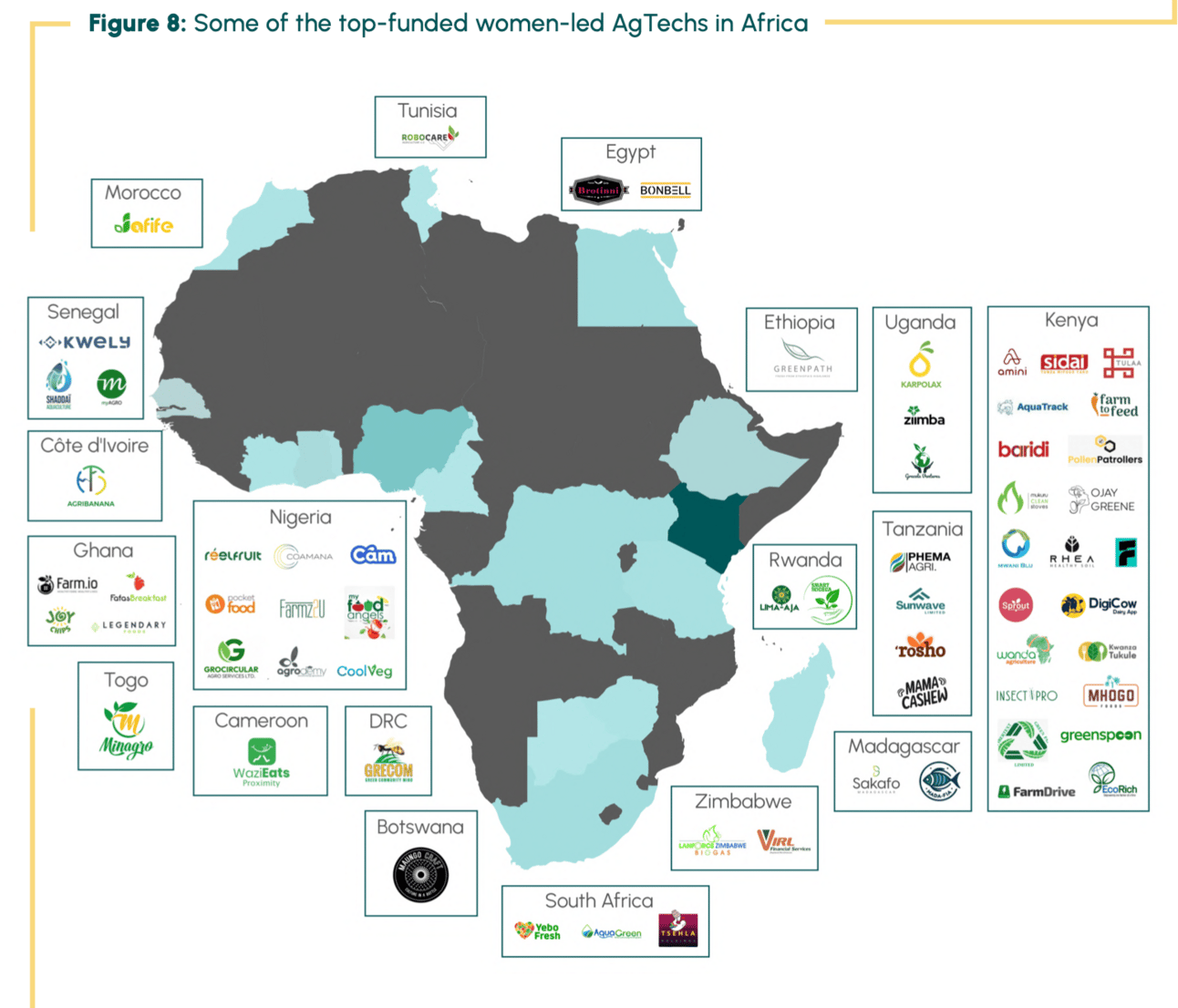From the subtle decline in Africa's birthrates to the African Development Bank's ambitious $20B financial safety net, macro changes are taking shape. This week some investors are doubling down and many stakeholders are wondering whether the U.S. will unfreeze critical HIV funding. And then there is the Aloba Arch in Chad. How’d I not know about that? Let’s get to it.
Thanks for reading and for sharing.
Africa Trivia
Which African country is home to one of the world's largest concentrated solar power plants?
Graphic of the Week
Decline…Even in Africa?

Source: McKinsey & Company
The shift is striking: Over half of the world’s economies, covering two-thirds of the global population, now have fertility rates below the replacement level of 2.1. The global demographic decline is here.
We often repeat that by 2050, one in four people globally will be African—which is true. But interestingly Africa’s birthrate is slowing a bit too (IMF, UNECA). That’s why my favorite read this week to provide the bigger picture context is about Africa’s “generation hustle”—a booming youth population where 60% are under 25. By 2030, half of all new global workers will come from sub-Saharan Africa. Unlike past generations, they’re more educated, digitally connected and entrepreneurial—but held back by sluggish economies. I couldn’t agree more. If you have time, read “How to help young Africans thrive” in the Economist!
What We Are Reading
Africa: African leaders approved an African Financial Stability Mechanism (AFSM) to prevent debt crises by providing concessional loans, hosted by the African Development Bank; if done right, it could save $20B in debt servicing costs by 2035 (Reuters).
Ethiopia’s sovereign wealth fund and UK’s Asset Green signed a $600M deal to develop a large-scale dairy farm and processing plant, with future plans for cotton, oilseed and rice cultivation (Bloomberg); Ethiopia’s bond investors accuse the IMF of overstating the country’s debt crisis despite a surge in exports, arguing that unnecessary debt relief is being pushed as part of a bailout (Financial Times).
Egypt: Archaeologists have discovered the tomb of King Thutmose II in Egypt, making it the first pharaoh's tomb found since Tutankhamun's in 1922 (BBC).
DRC: M23 rebels have seized Bukavu, escalating tensions and raising fears of a regional war (Bloomberg).
Mozambique: Fitch downgraded Mozambique’s credit rating from CCC+ to CCC due to economic struggles following post-election protests (360 Mozambique).
Nigeria's President Tinubu is pushing for an African-led credit rating agency (ACRA) for fairer assessments and reduced bias in global ratings (State House, Abuja).
Somalia: A U.S. airstrike in northeastern Somalia killed two Islamic State fighters, the second attack this month, as part of efforts to combat the growing insurgency in Puntland, where 1,200 militants are active (Bloomberg).
South Africa’s unemployment rate fell to 31.9% in the last three months of 2024, from 32.1% in the previous quarter (Bloomberg).
Uganda: On Feb 19th, 2025, Uganda discharged eight recovered Ebola patients and is keeping 265 contacts under strict quarantine (Reuters); This week, Uganda’s Jacob Kiplimo shattered the half marathon world record by running 56:42 in Barcelona, breaking the previous record by 48 seconds (BBC Sport).
Democracy in Africa
Djibouti Takes the Seat

Source: The Africa Daily Post
What Happened: Djibouti’s Foreign Minister, H.E. Mahmoud Ali Youssouf, was elected Chairperson of the African Union Commission, succeeding Moussa Faki Mahamat. Algeria’s Selma Malika Haddadi was sworn in as Deputy Chairperson.
Why It Matters: Youssouf’s leadership marks a shift in AU politics, as he takes charge during a period of rising geopolitical tensions and economic shifts across Africa (AU).
In case you missed it from last week, this is what he’s up against.
Tech & Society in Africa
Remittances > Aid

Source: The Outlier
Africans sent $90B+ home in 2023—more than foreign aid in several countries.
In Ghana, Zimbabwe, Lesotho, Egypt, Nigeria and Kenya, remittances outpace aid.
Unlike aid, remittances go directly to families for education, healthcare and business.
Why So Quiet? Aid gets headlines; remittances happen quietly, millions send money home.
Tech Boost: Mobile banking and fintech make transfers faster, cheaper and easier.
Read more in this Outlier.
Where’s Her Funding?

Source: Briter Bridges
Women produce 70% of Africa’s food. Interestingly, women founders receive only 7% of agtech funding. A Briter Bridges report highlights leading female founders, investors and experts navigating Africa’s agtech landscape (Briter Bridges).
Health in Africa
PEPFAR’s Deadly Pause
The Story: As we all know, a U.S. aid freeze halted PEPFAR (U.S. President’s Emergency Plan for AIDS Relief), endangering Africa’s fight against HIV/AIDS and risking millions of lives.
What Happened:
26 million lives saved: Since 2003, PEPFAR has been a lifeline for Africa’s HIV fight.
20 million (mainly in Africa) at risk: Patients rely on PEPFAR-funded antiretroviral (ARV) drugs to survive.
Clinics shut down: PEPFAR-funded health centers across Africa are closing.
40,000+ jobs cut: Kenya alone faces mass layoffs; Lesotho lost 1,500 health workers. 15,000 HIV specialists (5% of the workforce) in South Africa could be axed.
Waivers too slow: The U.S. promised exemptions but funding isn’t flowing.
Why It Matters:
HIV deaths are down 69% since 2004 but without meds, experts believe infections will surge.
PEPFAR built Africa’s HIV safety net—now it’s unraveling.
Read more: AP News
Europe in Africa
Russian Red Sea Gamble

Source: FT
What Happened: Sudan’s government greenlit a Russian naval base on the Red Sea, securing Moscow a key foothold as it scrambles for alternatives to its Syrian bases. General al-Burhan’s Sudanese Armed Forces clinched the deal, marking Russia’s full shift away from the rival Rapid Support Forces militia.
Why It Matters:
Strategic Move – The Red Sea is obviously a vital trade route, and a base there strengthens Russia’s military reach in Africa and the Middle East.
Syria Fallout – With Assad overthrown, experts believe that Moscow faces uncertainty over its bases in Syria and is hedging with new locations.
Power Struggle – Sudan’s war-torn government is shopping for international backers, pulling in Russia, Egypt and Qatar while the RSF maintains its own foreign ties.
Unstable Deal? – With Sudan’s leadership in flux, it’s unclear if this agreement will stick long-term.
Big Picture: Russia isn’t just looking for a base—it’s deepening its military role in Africa while reshaping alliances in Sudan’s civil war. Read more: Sudan says it has an agreed deal for Russian naval base.
Explorations in Africa

Source: The Travel
What It Is: Aloba Arch, located in Chad’s remote Sahara Desert, is one of the largest natural arches in the world—yet it remains vastly unknown.
Why It’s Unique:
Towering Height – At 403 feet, it's nearly four times taller than Utah’s famous Double Arch.
Massive Span – While its 250-foot width isn’t the world’s largest, it rivals some of the most famous arches in the U.S.
Extreme Isolation – Its remote location means few have ever seen it in person.
How It Formed: Scientists believe two erosion processes shaped the arch over thousands of years—one from collapsed sandstone and another from water erosion, creating its towering structure (The Travel). And if you want to know what it’s like to actually visit (and climb it), check out the 12-minute video at the bottom of this article: Atlas of Wonders.
Africa Trivia Response
Answer: D) Morocco – The Noor Ouarzazate Solar Complex is one of the world's largest concentrated solar power (CSP) plants, with a capacity of around 580 MW. CSP is a technology that generates electricity by concentrating sunlight to produce heat.
Read more: Ouarzazate Solar Power Station - Wikipedia
If you’re enjoying The Africa Brief, please share with your family and friends. We’d love to have them follow along with Africa’s macro trends too!
Email us at ([email protected]) if you have some scuttlebutt we should follow up on.



